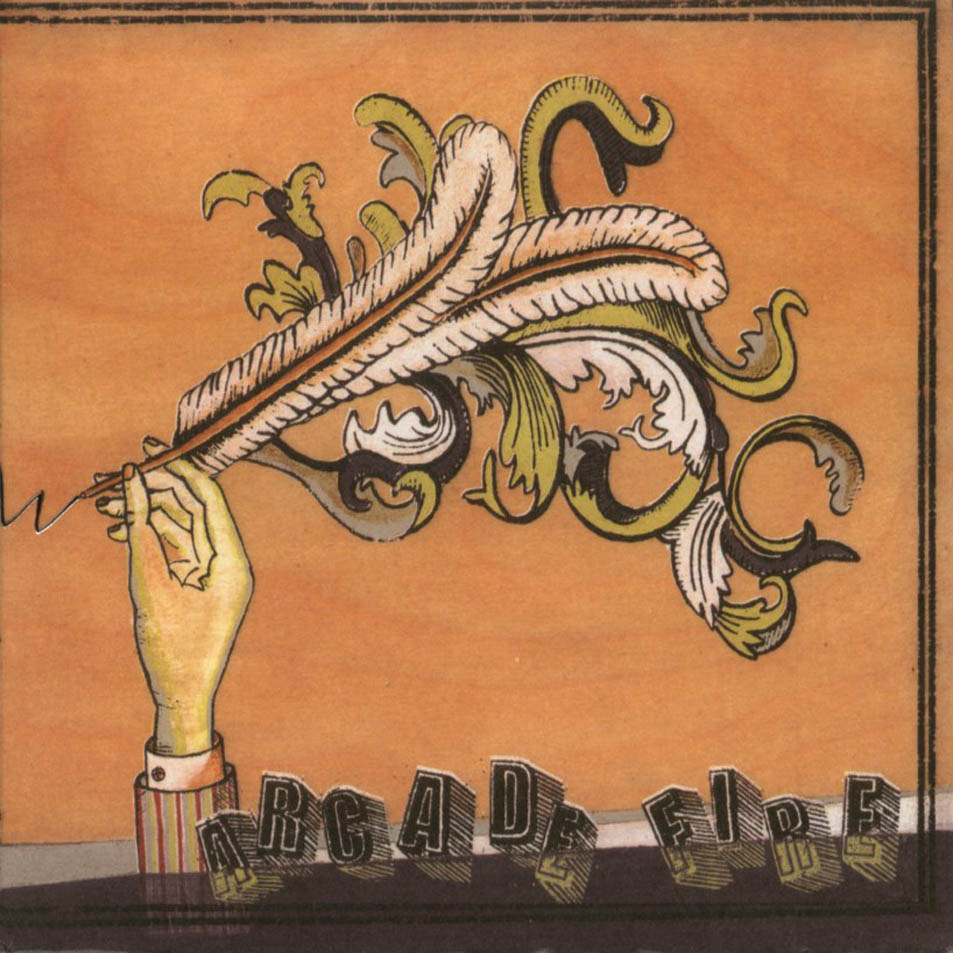
Ten years ago this week, Arcade Fire released Funeral, an album that not only transformed this once-ramshackle Montreal orchestro-rock collective into instant indie-rock icons, but forever transformed the very concept of indie rock from a fringe movement born of economic circumstance into an aspirational career model. Arriving just as the Internet’s corrosive effect on major-label hegemony was becoming apparent, Funeral showed how a fearless, fiercely committed band could take advantage of the power vacuum—in the album’s wake, "indie" became not so much an ideological rebuke to the concept of playing arenas as an alternate, service-road path to realizing it. (Not that this outcome was anticipated by the band itself; even as it was touring Funeral to sold-out concert-hall crowds well into 2005, Arcade Fire was still self-managed and stuffing its tickle-trunk array of instruments into a van.) They certainly weren’t the first emergent early-2000s act to be greeted with hyperbolic hosannas from the get-go, but more so than the Strokes or Broken Social Scene or the Yeah Yeah Yeahs or Franz Ferdinand, the influence of Arcade Fire continues to ripple both under and over-ground, through every upstart band you see at SXSW doing a line-check with a violin to the uppermost reaches of the Billboard Top 200.
And yet, all the ways Funeral has altered the contemporary musical landscape—from its promotion of pilgrim bible-student chic to its implicit requirement that every band now have an auxiliary floor-tom for intermittent bashing—no aspect of the album has proven as pervasive as this:
The wordless, heaving chorus of "Wake Up" remains one of the most thrilling, bracing moments in recent rock history, the sort of jaw-dropping jolt that you’ll always remember experiencing for the first time. (For me, it was at Arcade Fire’s Oct. 2003 opening gig for the Constantines at Toronto’s Horseshoe Tavern, where the band’s upchucking performance of the song made it feel like you were standing in front of a jet turbine.) It’s the sound of all the pain and frustration that went into the making of Funeral being unleashed in one tsunami-sized cry, an enduring testament to the communal power and cathartic effect of singing in unison. It’s also become the most ubiquitous vocal device in contemporary rock, the 21st-century indie equivalent of what Eddie Vedder’s “I don’t mind stealing brrreaad” groan became for late-’90s alterna-grunge.
Of course, Arcade Fire belong to a grand tradition of choral crusaders. The wordless crescendo is a hallmark of classic-rock anthems from "Born to Run" to "Biko" (and what is "Wake Up" if not "Hey Jude" played in reverse, with the climactic group sing-along promoted to lead position and the humble pop-song portion punted off to the end?). But among the current crop of post-Funeral phenoms, such exclamatory outbursts are no longer just vocal punctuation for those moments when words can no longer express the emotions coursing through a song; in many cases, they are the song, the starting point around which all other compositional elements rally. Tuning into a modern-rock radio station in 2014 means being subjected to a relentless procession of "woah-oh-oh-ohs!" and "ho yeahs!" and "heys!" and songs filled with so many "hos!" and "heys!", that there’s no choice but to give them titles like "Ho Hey." And perhaps an even more telling gauge of Funeral’s world-beating impact isn’t all the imitators it’s spawned, but the veteran acts who’ve since adopted its group-chant gravitas, from Coldplay to U2, whose recently released, iTunes-clogging single "The Miracle (of Joey Ramone)" feels like the inevitable end game for a band that once pumped up audiences on its 2005 Vertigo tour by blasting—you guessed it—"Wake Up" over stadium PAs.
In retrospect, U2’s entrance-music maneuver savvily anticipated how Funeral’s songs of death and familial strife could so easily be reduced to simple, crowd-baiting hysterics (which may explain why Arcade Fire have since adhered to a policy of I-guess-we’ll-just-have-to-adjust, largely abandoning the chain-gang approach for somber social commentary, conceptual narrative, and glittery groove). And it’s no coincidence that the proliferation of this shout-it-out vocalese has occurred in tandem with the rise of indie-oriented big-ticket music festivals, where emergent acts must engage with audiences several times larger than those they’d normally draw on their own—and it’s a lot easier to initiate that engagement through non-lyrical, group-chorus peer pressure. To be an aspiring rock band in the post-Funeral era means never having to say, "sing along if you know the words," because oftentimes you don’t need actual words.